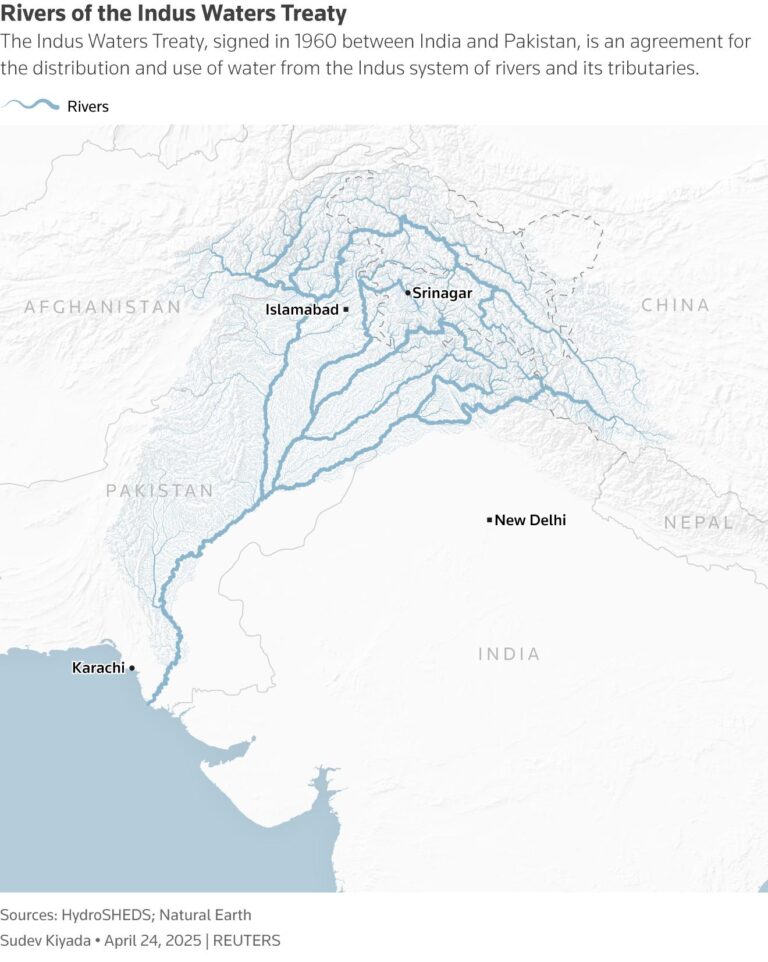In a stern warning to India over the long-standing Indus River water dispute, Pakistan’s Foreign Minister Bilawal Bhutto Zardari has asserted that Islamabad faces a crucial choice: either engage in fair and equitable sharing of the Indus waters or risk losing access to all six rivers under the Indus Waters Treaty. Speaking amid escalating tensions between the two neighboring countries, Bhutto’s remarks underscore the growing strain on bilateral relations and highlight the critical importance of water diplomacy in South Asia’s most contentious geopolitical landscape.
India Faces Diplomatic Crossroads Over Indus Water Sharing Bilawal Bhutto Calls for Equitable Distribution Amid Rising Tensions
Pakistan’s Foreign Minister Bilawal Bhutto Zardari has issued a stark warning to India amidst escalating tensions over the Indus Waters Treaty, emphasizing the pressing need for a just and equitable distribution of water from the six rivers governed by the historic agreement. Speaking at a recent diplomatic forum, Bhutto stressed that India faces a clear choice: “Either share the Indus water fairly or face the consequences of Pakistan asserting its full rights over all six rivers.” This statement signals a potential shift in Pakistan’s stance, raising the stakes in one of South Asia’s most persistent bilateral conflicts.
- Current Treaty Framework: Administered jointly since 1960, the Indus Waters Treaty allocates three rivers primarily to Pakistan and three to India, aiming to prevent disputes.
- Water Security Challenges: Pakistan cites concerns of diminishing flow and unilateral Indian projects like hydropower dams as threats.
- Diplomatic Impact: Rising rhetoric could influence ongoing dialogue and regional stability.
| River | India’s Control | Pakistan’s Control |
|---|---|---|
| Indus | Limited | Major |
| Jhelum | Restricted Usage | Primary User |
| Chenab | Limited Projects | Major User |
| Sutlej | Major User | Limited |
| Beas | Full Control | None |
| Ravi | Full Control | Minimal |
With water scarcity intensifying across the subcontinent due to climate change and population growth, the Indus waters have taken on strategic importance. Experts warn that failure to resolve disputes amicably could provoke unilateral actions, including dam construction and water diversion that may further strain endless mistrust. Bhutto’s declaration underscores the critical juncture at which India and Pakistan find themselves: a path Pakistan’s Foreign Minister Bilawal Bhutto Zardari has issued a firm warning to India amid rising tensions over the Indus Waters Treaty, stressing the urgent need for fair water distribution from the six rivers covered by the treaty. Bhutto stated that India must either share the water equitably or face Pakistan asserting full rights over all six rivers. This reflects a potential hardening of Pakistan’s position and could heighten the longstanding India-Pakistan water conflict.
Key Points:
- Treaty Background:
The Indus Waters Treaty (IWT), signed in 1960, is a longstanding agreement that distributes control of six rivers in the Indus basin between India and Pakistan. India primarily controls three eastern rivers (Ravi, Beas, Sutlej), while Pakistan primarily relies on the three western rivers (Indus, Jhelum, Chenab).
- Current Control & Usage:
| River | India’s Control | Pakistan’s Control |
|——–|———————-|———————–|
| Indus | Limited | Major user |
| Jhelum | Restricted usage | Primary user |
| Chenab | Limited projects | Major user |
| Sutlej | Major user | Limited |
| Beas | Full control | None |
| Ravi | Full control | Minimal |
- Pakistan’s Concerns:
Pakistan has expressed worries about diminishing water flows attributed to Indian projects such as hydropower dams and possible unilateral water diversions, which it views as threats to its water security.
- Diplomatic Implications:
The rising rhetoric signals increasing strain in bilateral relations and could challenge ongoing diplomatic efforts. Experts caution that any unilateral move on either side risks escalating tensions and destabilizing regional peace.
- Broader Context:
Climate change and population growth are intensifying water scarcity concerns across South Asia, adding urgency to resolving Indus water disputes amicably.
Conclusion:
Bhutto’s statement marks a critical moment, emphasizing the necessity for dialogue and cooperation to ensure water-sharing arrangements remain fair and sustainable. Failure to do so could push the region toward greater confrontation over this vital resource.
Strategic Implications of River Water Disputes Bilawal Bhutto Warns of Pakistan’s Potential Control Over Six Rivers
Bilawal Bhutto’s recent statement highlights the escalating tensions surrounding the Indus Waters Treaty, signaling a potential shift in Pakistan’s approach to its river water rights. Amidst growing concerns over India’s water-sharing practices, Bhutto’s warning underscores that Pakistan may consider exercising full control over all six rivers if equitable sharing of the Indus waters is not assured. This stance not only raises the stakes in bilateral relations but also reflects deeper strategic concerns, including water security, regional stability, and economic impacts on both nations.
Key strategic implications include:
- Potential disruption of agriculture and livelihoods dependent on the Indus basin.
- Increased geopolitical friction between India and Pakistan, complicating diplomatic efforts.
- The necessity for robust regional water management frameworks to prevent conflict escalation.
| River | Current Control | Potential Impact of Control Shift | ||
|---|---|---|---|---|
| Indus | Shared | Critical for Pakistan’s agriculture | ||
| Chenab | Primarily Pakistan | Vital for hydroelectric projects | ||
| Jhelum | Primarily Pakistan | Jhelum | Primarily Pakistan | Supports irrigation and power generation |
| Beas | Primarily India | Essential for Indian agriculture | ||
| Ravi | Primarily India | Supports Indian agriculture and industry | ||
| Sutlej | Primarily India | Crucial for irrigation and hydroelectric power |
If you want me to help with any other part of this content or integrate additional elements, just let me know!
Recommendations for Sustainable Water Cooperation Bilawal Emphasizes Dialogue and Joint Management to Avoid Conflict
Bilawal Bhutto has underscored the urgency of adopting a collaborative approach to managing the Indus River system, warning that unilateral actions by India could escalate tensions in the region. Highlighting the complex interdependence of the six rivers that sustain millions in both countries, he advocates for structured dialogue channels and joint management frameworks as essential tools to prevent conflicts and ensure equitable distribution of water resources.
Key recommendations proposed by Bilawal include:
- Establishment of bilateral water commissions with decision-making authority
- Regular data sharing and transparency on river flow and usage
- Implementation of sustainable water conservation projects along shared basins
- Conflict resolution mechanisms grounded in international water laws
| Recommendation | Expected Outcome |
|---|---|
| Bilateral Water Commissions | Joint governance and dispute resolution |
| Data Transparency | Improved trust and informed policy-making |
| Sustainable Conservation Projects | Enhanced water availability and ecosystem health |
| Conflict Resolution Mechanisms | Peaceful settlement of disputes |
In Summary
As tensions over the Indus Waters Treaty continue to simmer, Bilawal Bhutto’s latest remarks underscore the fragile nature of water-sharing agreements between India and Pakistan. With both nations reliant on these vital river systems, the path forward demands careful diplomacy and mutual respect. Whether New Delhi opts to uphold equitable water distribution or risks escalating the dispute remains a critical question-one that carries significant implications for regional stability and cooperation in South Asia.




